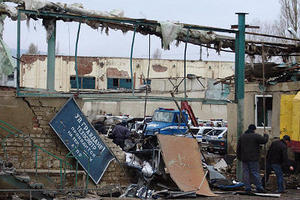Russian extremists remotely detonate suicide bombs
Investigators believe that the suicide bomb in Russia’s airport was remotely triggered by a cell phone; officials found melted circuit boards that suggest a cell phone was embedded with the bomb; CCTV footage corroborates this theory; Russian extremists from the northern Caucasus often include remote triggers in their suicide bombs to allow handlers remotely to detonate the explosive device in the event that the attacker changes their mind or becomes incapacitated; in a recent failed attack, a spam text message prematurely triggered a female suicide bomber’s explosive device on New Year’s eve foiling a plot to kill hundreds in central Moscow

Suicide bombing results in Dagstan // Source: csmonitor.com
Russian authorities investigating the recent suicide bombing at Domodedovo Airport believe that the bomb may have been detonated remotely.
According to Russian media, investigators have found melted circuit boards that suggest a cell phone was embedded in the plastic explosives used in the attack.
Officials believe that one of the bomber’s associates may have detonated the bomb after they thought the bomber had changed their mind. Footage from security cameras corroborates this theory, as it shows the bomber apprehensively pacing around the airport’s baggage claim area for nearly fifteen minutes before the bomb was finally detonated.
An investigator said that, “It’s possible that one of his accomplices, thinking he would not press the button, remotely blew him up by making a phone call on the cell phone embedded in the bomb.”
According to the Leader Post, terrorist groups in Russia often include a remote detonator in their bombs to ensure the attack’s success.
The bomber’s handler, watching from afar, will detonate the device by sending a text message when the explosion will inflict the most casualties in the event that the bomber changes their mind at the last moment or becomes incapacitated.
In a recent failed attack, a female suicide bomber was killed when her device was accidentally triggered by a text message. The attack had been planned for New Year’s Eve in Moscow’s Red Square, but the suicide belt detonated at the safe house after the phone’s mobile service provider sent a mass message wishing all of its subscribers a happy new year.
Authorities believe that the woman killed by the errant text message was part of the same organization that struck Moscow’s airport on 24 January.
A recent autopsy revealed that the airport suicide bomber was heavily drugged.
Alexander Bortnikov, the chief of Russia’s Federal Security, said that the bomber’s body had “huge amount of highly potent drugs and psychotropic substances.”
The bomb killed thirty-five and wounded more than 120 people.
